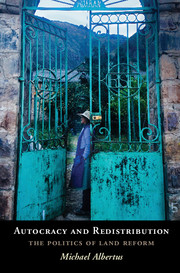Book contents
- Frontmatter
- Contents
- List of Tables
- List of Figures
- Acknowledgments
- 1 Introduction
- 2 Actors, Interests, and the Origins of Elite Splits
- 3 A Theory of Land Reform
- 4 Measuring Land Reform
- 5 A Cross-National Analysis of Land Reform in Latin America
- 6 Elite Splits and Redistribution under Autocracy: Peru's “Revolution from Above”
- 7 Land Reform Transformed to Redistribution: Venezuela's Punto Fijo Democracy and Chávez's Bolivarian Revolution
- 8 Latin America in Comparative Perspective
- 9 Conclusion
- References
- Index
- Other Books in the Series
6 - Elite Splits and Redistribution under Autocracy: Peru's “Revolution from Above”
Published online by Cambridge University Press: 05 October 2015
- Frontmatter
- Contents
- List of Tables
- List of Figures
- Acknowledgments
- 1 Introduction
- 2 Actors, Interests, and the Origins of Elite Splits
- 3 A Theory of Land Reform
- 4 Measuring Land Reform
- 5 A Cross-National Analysis of Land Reform in Latin America
- 6 Elite Splits and Redistribution under Autocracy: Peru's “Revolution from Above”
- 7 Land Reform Transformed to Redistribution: Venezuela's Punto Fijo Democracy and Chávez's Bolivarian Revolution
- 8 Latin America in Comparative Perspective
- 9 Conclusion
- References
- Index
- Other Books in the Series
Summary
Chapter 5 provides broad confirmatory evidence for the theory linking elite splits and institutional constraints to rule to land redistribution using large statistical tests at the country level. Chapters 6 and 7 focus on Peru and Venezuela and take a different, but complementary, approach. Each chapter first begins by examining whether the timing and type of land reform corresponds with the theoretical predictions from Chapter 3. But the principal aims of these chapters are to probe the theory's causal mechanisms and to test observable implications, thereby demonstrating the internal validity of the theory. In addition, these chapters show the usefulness of the theory in generating an understanding of the spatial and temporal variation in land reform within countries.
The conditions under which land reform occurred in Peru and Venezuela, along with the subnational data I employ to analyze these programs, also help develop further observable implications of the theory and illuminate the relevance of the land reform typology outlined in Chapter 4. Land reform in Peru occurred mainly as land redistribution under military rule. Land reform in Venezuela took place largely through land negotiation and land colonization under democracy, and then more recently under Hugo Chávez and Nicolás Maduro as land redistribution under an increasingly autocratic regime. The Peru case demonstrates social differentiation in the peasant groups that received land through the military's land redistribution program from 1968 to 1980. This sheds light on the organizational capacity necessary for members of the rural poor to become land reform beneficiaries. The Venezuela case provides further insights into the logic of land negotiation and land colonization and how these programs are structured to become politically popular under democracy even though they are less redistributive than land redistribution programs.
CASE SELECTION FOR SUBNATIONAL ANALYSES
Several reasons support the decision to examine Peru and Venezuela in greater detail. First, both countries varied substantially over time in elite splits and institutional constraints, which enables careful tracing of the causal mechanisms driving land redistribution. The variation in elite splits provides a chance to investigate in depth the coalitional dynamics between ruling political elites and landed elites and how and why key insiders of the political elite's initial support coalition push for land redistribution policies when there is a split from landed elites.
- Type
- Chapter
- Information
- Autocracy and RedistributionThe Politics of Land Reform, pp. 190 - 224Publisher: Cambridge University PressPrint publication year: 2015



